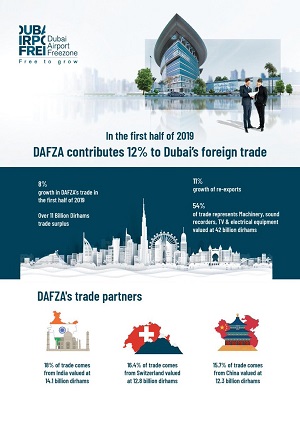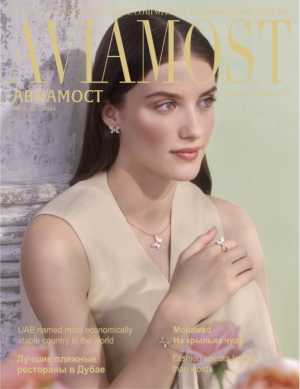DAFZA contributes 12% to Dubai’s foreign trade in first half of 2019
By Huiming_Shi Wednesday, 16 October 2019 12:46 PM

(WAM) Dubai Airport Freezone Authority, DAFZA, has further established itself as a global facilitator for business growth and prosperity and a vital engine for Dubai's economy following the announcement of its half year results for 2019.
DAFZA's contribution to Dubai's foreign trade reached 12 percent in the first half of the year, confirming the success of its plans to enhance its role in Dubai and to establish its presence amongst the free zones as one of the most developed, advanced and distinguished at the national and regional levels.
The results of the first half of 2019 confirmed the success of DAFZA in achieving high growth rates compared to the same period last year, where it achieved a growth of 8 percent in the total value of foreign trade which exceeded AED 78 billion, an increase of 5.7 billion AED. This was driven by an 11 percent growth in re-exports, which reached a value around AED 45 billion, representing 21 percent of the total re-exports in Dubai.
For the second consecutive year, the free zone also achieved a large trade surplus of over AED 11 billion in the first half of 2019, a growth of 35 percent compared to the same period last year.
H.H. Sheikh Ahmed bin Saeed Al Maktoum, Chairman of Dubai Civil Aviation Authority and Chairman and Chief Executive of Emirates Airline and Group, and also Chairman of DAFZA, said that the results of the first half of 2019 confirm the status of the free zone as a major contributor to the UAE economy in general and Dubai in particular.
The results also highlight its strategic role in facilitating global trade through Dubai, which is a key gateway for various countries and continents around the world and is a meeting point for routes linking East, West, North and South.
Sheikh Ahmed bin Saeed added that these results are a reflection of the free zone’s efforts to increase foreign direct investment, FDI, to the emirate and sustain its business growth. This reaffirms the initiatives of Dubai’s leadership and government in stimulating economic activity and adapting to the economic fluctuations the world is facing, from trade tensions to slowdown in global growth.
He explained that it is a visionary and a strategic move to ensure the stability and growth of business and to maintain a high-level of confidence for investors in the emirate. DAFZA’s growth over the past two decades is a confirmation of its role in achieving the emirate’s objectives and strategic plans of economic diversification away from dependence on oil according to a clear economic vision for the future.
Dr. Mohammed Al Zarooni, Director General of DAFZA, commented that DAFZA has continued to play a key role in enhancing the growth of Dubai's economy, through its solid plans which ensure that the free zone is home to major international companies, as well as ambitious small and medium-sized companies planning to expand across the UAE and the region. Al Zarooni added that the results of the trade movement through the free zone are a direct reflection of the positive image and confidence placed by foreign companies and investors in DAFZA and is an important milestone that showcases the various elements that ensure the ease of trade.
India accounted for the highest percentage of DAFZA's trade with 18 percent at AED 14.1 billion, followed by Switzerland with 16.4 percent at AED 12.8 billion. China accounted for 15.7 percent with AED 12.3 billion.
Switzerland topped the list of countries in terms of re-exports from DAFZA by 27 percent, valued at AED 12 billion, a growth of 16 percent compared to the same period last year. India ranked first in terms of its contribution to the imports of DAFZA and accounted for 41 percent, valued at AED 13.8 billion with a 16 percent growth compared to last year.
In terms of types of goods, DAFZA witnessed a great diversity from various industries where the group of machinery and electrical equipment ranked first with 58 percent of the total re-export value of 25.7 billion AED, an increase of 15 percent. Furthermore, this sector accounts for 48 percent of total imports worth AED 16.2 billion. This was followed by pearls, semi-precious stones and metals with 35 percent of the total re-export value of AED 15.5 billion and 43 percent in terms of total imports worth AED 14.5 billion. Both sectors represent 92 percent of DAFZA’s total trade.




























Add new comment